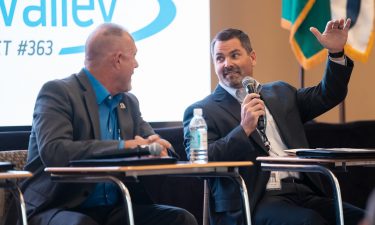The issues sessions for day two of the Joint Chamber Olympia Fly-in began with Health Care. Much of the conversation centered around the opioid epidemic and mental health.
In Sen. Ann Rivers’ view, last year the Legislature tackled the issue of access to opioids. This year, she feels that treatment needs to be the priority. And because of the complexity and breadth of the problem, the “solution needs to be elegant”. Pharmaceutical pricing is the other item Sen. Rivers is focused on. With the price of pharmaceuticals going up with each stop on the supply chain, she hopes to introduce a bill that would result in full and true transparency of the cost of drugs.
Rep. Joe Schmick also had continued concerns regarding opioids, but was also concerned about the rise in heroin use and transferring from one addiction to another.
Rep. Marcus Riccelli noted that legislation was moving forward which would add WSU’s College of Medicine to the Family Medicine Education Board, another small victory for increasing the number of residents in Eastern Washington. He was also very excited about a matching program that is in development, whereby medical students who commit to a service term in rural communities would be eligible for assistance with their medical school loans.
As we moved into the Operating/Capital Budget Session, there began to be rumblings of a Capital Budget agreement and Hirst fix, both of which are priorities on GSI’s legislative agenda.
Sen. John Braun noted the importance of Washington having a balanced four year budget, the only state in the country where this is the case. Supplemental budgets, as will be the case this year, will focus on adjustments. But with a four year budget and revenue projections up, the state is in a good position. He also mentioned “McCleary fatigue” – other industries, groups, etc. not receiving funding over the last five years as McCleary was addressed. McCleary fatigued was expressed by multiple legislators. When asked about the next McCleary, the next big problem potentially facing the legislature, Braun felt that pension liability is the greatest risk.
In addition to the Court’s ruling back in November that the legislature fix to McCleary wasn’t fast enough, Sen. Christine Rolfes also noted the federal lawsuit against Western State Hospital as a legal matter which will affect the budget.
With the legislators confident that the capital budget would be passed, Rep. Richard DeBolt shared some of the details with the group. The passed budget is largely the same as it was written in July, except for minor technical changes. The Governor’s carbon bill was also a topic of much discussion. Rep. DeBolt stressed the importance of any carbon bill counting hydro power as green and a B&O tax reduction for any companies that reduce their carbon emissions, saying, “If government wants to charge for carbon emissions, they should be willing to pay for carbon reductions.”
The final session of the fly-in brought in leadership from both parties for the Four Corners Session. Deputy Majority Leader, Sen. Andy Billig from Spokane spoke about the new Democratic majority in the Senate and its effect on the legislative process, primarily that bills that didn’t make it out of committee over the last few years will have a better chance now. And that a 25-24 split means more movement towards the middle and compromise. This session Billig anticipated some follow-up fixes to HB 2242, which addressed school funding.
Regarding HB 2242, Rep. Timm Ormsby expects there to be property tax fluctuations over the next few years as updates are made to 2242. Ormsby stressed the importance of using not only accurate revenue projections, but also accurate spending models in operating budget setting. Ormsby praised the eastern Washington delegation for working so well together, even with philosophical differences. He also praised the Joint Chamber Fly-in, saying it’s the envy of other communities.
Senate Republican Leader, Sen. Mark Schoesler, emphasized that with the change in majority, he didn’t want to see any “backsliding” on the accomplishments of the last four to five years – particularly a four year balanced budget and the freezes/reduction in university tuition. With the news of the Capital Budget and Hirst fix breaking throughout the day and session, Schoesler shared that the number one element of to the Hirst fix is that it would provide certainty. The Governor’s propsed carbon tax was much discussed over the two days in Olympia, Schoesler’s thought is that it would be a partly line vote.
The day and the fly-in ended with Minority Caucus Chair, Rep. Matt Shea. He felt there was limited support on both sides of the aisle for a carbon tax. Shea believed that funding for the Spokane Sportsplex looked promising.




